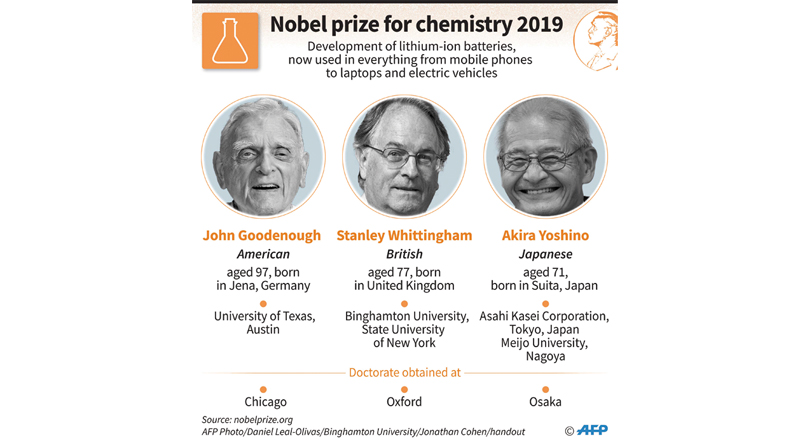In 1941, in the United Kingdom, Stanley Whittingham was born, a chemist whose research would transform the face of modern energy. Graduating from the prestigious universities of Oxford and Stanford, his early innovations in the 1970s paved the way for a technological revolution: lithium-ion batteries. These, although still experimental in their beginnings, revealed immense potential for energy storage, essential in the fight against the oil crises of the time. In 2019, alongside John B. Goodenough and Akira Yoshino, Whittingham was awarded the Nobel Prize in Chemistry, recognizing their crucial role in the development of these batteries that power many indispensable devices in our daily lives today.
Stan Whittingham, an iconic figure in chemistry, has marked the history of renewable energies through his decisive contribution to the development of lithium-ion batteries. Born in 1941 in the United Kingdom, this talented chemist was trained at the prestigious universities of Oxford and Stanford. His professional journey began with his hiring by Exxon in 1972, where he tackled the energy challenges of the time with remarkable ingenuity.
It was during the context of the oil crises of the 1970s that Whittingham began to explore the potential of lithium, although this revolutionary discovery was accompanied by a major problem: the excessive reactivity of lithium made it dangerous for widespread use. Despite these obstacles, his visionary work laid the foundations for the technology that would transform our daily lives.
Stan Whittingham’s efforts to improve the safety and efficiency of lithium-ion batteries not only enabled their breakthrough in the early 2000s but also shaped the future of energy solutions. In 2019, his work was rightly recognized by the Nobel Prize in Chemistry, shared with John B. Goodenough and Akira Yoshino. Today, as a professor at Binghamton University, he continues to inspire new generations of scientists to tackle global energy challenges.

stan whittingham’s career beginnings
Stanley Whittingham began his academic career in the United Kingdom. Born on December 22, 1941, he grew up in Nottingham and studied chemistry at Oxford University, where he earned his degree. Whittingham has always been interested in scientific solutions to global challenges. After his time at Oxford, he headed to the United States to continue his research at Stanford University. Armed with his skills, he joined Exxon in 1972, a time marked by the consequences of the oil crises. It was in this complicated economic context that Whittingham began to explore solutions for storing energy more efficiently and economically.
Whittingham’s arrival at Exxon opened a new chapter in the field of materials science. He developed one of the first lithium-ion batteries, a revolutionary concept at the time. Based on the potential of this material, he successfully created a lithium anode that promised more efficient energy storage. However, despite his innovations, lithium presented technical challenges, particularly due to its high reactivity. This first step nevertheless laid the groundwork for a technology that would have a global impact a few decades later.
technological exploration and scientific breakthroughs
Faced with the difficulties of lithium, Whittingham embarked on fruitful collaborations with other researchers to overcome these obstacles. The momentum he gave to the development of batteries attracted the attention of numerous companies and laboratories around the world. During his later work, particularly when he joined Binghamton University, Whittingham continued to refine his initial concepts. The development of lithium-ion batteries owed much to these years of research, reflection, and experimentation.
Whittingham’s breakthrough profoundly influenced entire generations of scientists and engineers, pushing the boundaries of technology to make batteries safer and more efficient. His collaborative work with John Goodenough, another renowned chemist, helped solidify the path towards even more powerful and less volatile batteries. Each advancement became a step towards the democratization of portable devices, from laptops to future electric vehicles, transforming our way of consuming energy.
recognitions and global impact
Recognition for Whittingham’s work came in 2019 when he, alongside John B. Goodenough and Akira Yoshino, received the Nobel Prize in Chemistry. This award honoring their contribution to the development of lithium-ion batteries highlighted the global impact of their research on energy transition. These batteries, now ubiquitous, have become an essential link in the fight to reduce dependence on fossil fuels and promote the rise of renewable energies.
The journey of Stanley Whittingham is a clear example of how an innovative idea, although initially unsuitable for practical applications due to material limitations, can slowly evolve to have a profound and lasting impact on our modern world. For more details on his biography and impact, explore the resources here: Stanley Whittingham.
Articles similaires
Thank you!
We will contact you soon.














